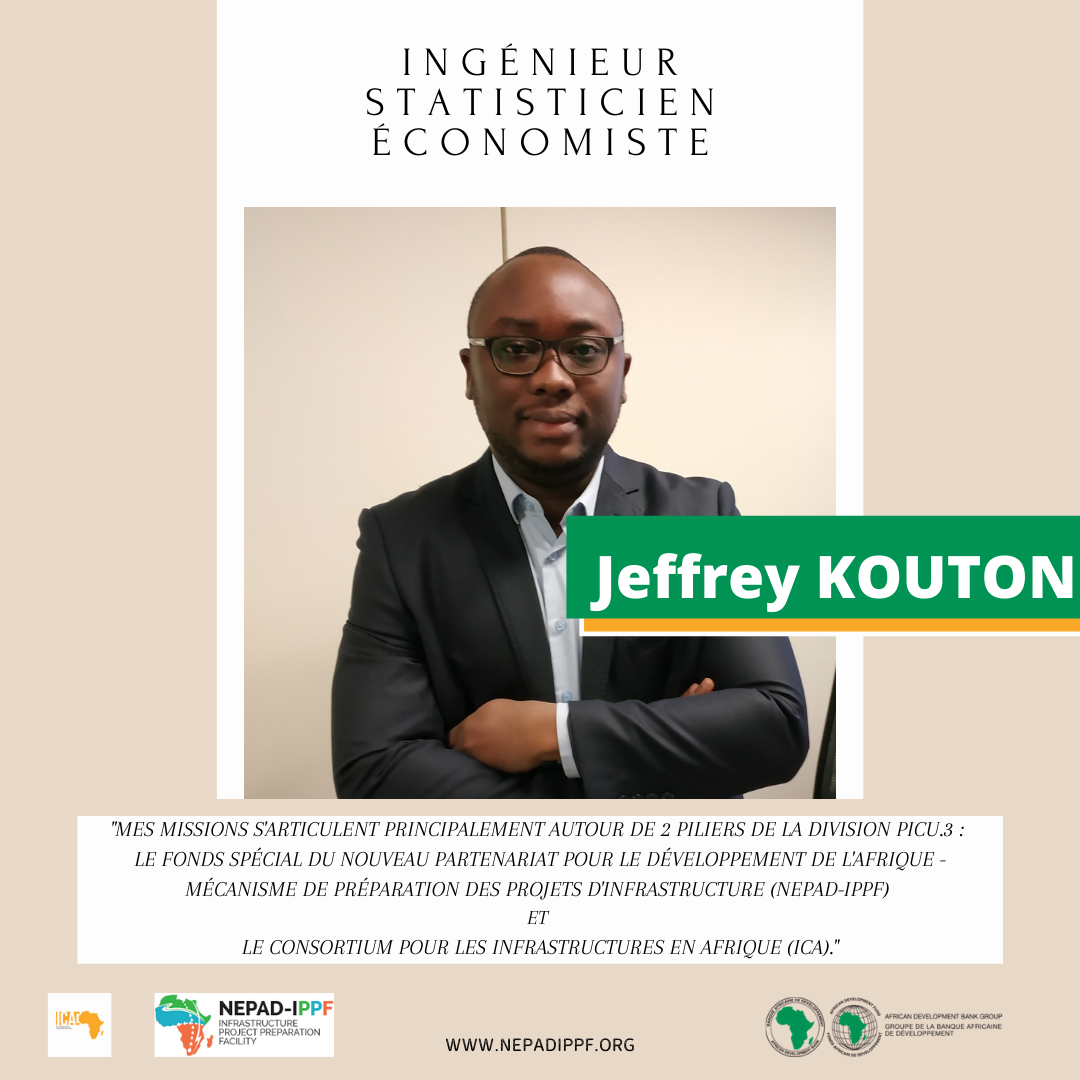Jeffrey KOUTON is a Statistician Engineer and Economist who graduated from the National School of Statistics and Applied Economics of Abidjan (ENSEA). He also holds a Bachelor’s degree in Applied Statistics from the National School of Applied Economics and Management (ENEAM) in Cotonou, Benin, as well as a Bachelor’s degree in Economics, with a specialization in Development Policy Analysis, from the Faculty of Economics and Management (FASEG) of the University of Abomey-Calavi, Benin. Before joining the Infrastructure Partnerships Division (PICU.3) of the African Development Bank, he worked in several study and research centers in Côte d'Ivoire and Benin on issues related to debt and budget deficit, banking sector liquidity, fragility, and structural transformation. He has also published more than a dozen scientific papers in international peer-reviewed journals on topics related to renewable energy, ICT development, inclusive growth, global value chains, and institutional quality. Let’s meet up this statistical genius to whom we can concede three great qualities: humility, rigor, and professionalism.

NEPAD-IPPF: You are an Economist in the AfDB's Infrastructure Partnerships Division (PICU.3) under the direction of Mr. Mike Salawou. You have an extensive experience working on infrastructure operations planning and programming. What are your assignments?
Jeffrey Kouton: I joined the Infrastructure Partnerships Division (PICU.3) of the Bank in 2018. My assignments are mainly structured around two of the four pillars of the PICU.3 Division: The New Partnership for Africa’s Development – Infrastructure Project Preparation Facility (NEPAD-IPPF) Special Fund and the Infrastructure Consortium for Africa (ICA).
My assignments are mainly structured around two of the four pillars of the PICU.3 Division
On the first pillar (NEPAD-IPPF), I work on infrastructure projects and portfolio management. Concerning project management, I play a leading role in the preparation and monitoring of the infrastructure projects annual work program. I work with infrastructure projects specialists and project executing agencies in advancing NEPAD-IPPF projects through the project cycle from appraisal to completion, particularly in the areas of procurement in collaboration with relevant AfDB departments. As for portfolio management, my role is to coordinate the call for proposals process including screening of full proposals, and to maintain a pipeline/portfolio management platform that tracks projects across all NEPAD-IPPF components and to maintain up-to-date records of the state of advancement of NEPAD-IPPF projects. For that purpose, I am currently coordinating and monitoring the development and implementation of an operational digital portfolio management platform for NEPAD-IPPF. The scope of my portfolio management activities also includes monitoring the performance of the NEPAD-IPPF portfolio against the AfDB results management framework and NEPAD-IPPF Key Performance Indicators, using consolidated data from project level reporting as well as Fund-level performance.
On the second pillar (ICA), I provide technical and operational assistance for the activities of the Consortium, in particular with regard to membership engagement activities and to the preparation of Infrastructure Financing Trends (IFT) report in Africa. The IFT report is the ICA annual report on how financial resources are being mobilized to facilitate the development of Africa’s transport, water and sanitation, energy and ICT infrastructure sectors. This report, among other topics, brings to the forefront the discussion on sustainable and quality infrastructure which is a great contributor to economic prosperity and development. It highlights the role ICA Members play in institutional and policy reforms as well as their consistent financial contribution within the infrastructure space.
I am also involved in the preparation of infrastructure policy briefs and materials in various infrastructure sector development-related subjects, including analytical, statistical and research work on a wide range of operational and regional issues on infrastructure.
Last but not least, I participate in the implementation of the Division’s Economic Sector Work (ESW) agenda and priorities.
NEPAD-IPPF: What does your target portfolio looks like?
Jeffrey Kouton: The NEPAD-IPPF has established a strong foot-print as the lead project preparation facility that focuses on the preparation of regional infrastructure projects in Africa. In doing so, it plays a catalytic role through the preparation of regional infrastructure projects and programs in support to the Program for Infrastructure Development in Africa (PIDA) and RECs. As such, NEPAD-IPPF priority is given to preparatory activities with a high probability of generating viable regional infrastructure projects that can secure financing from public and/or private sources. Taken into account the global context, the ongoing COVID-19 pandemic has demonstrated the need for resilient and adaptable infrastructure that can effectively operate during moments of unexpected crisis. The post-pandemic recovery efforts will require increased investment in technologically advanced, sustainable and resilient infrastructure. We plan to adapt accordingly by increasing project origination and preparation in these areas.
NEPAD-IPPF: How do you perceive the relationship between the multi-donors, the Regional Economic Communities (RECs), the NEPAD-IPPF Special Fund and the ICA?
Jeffrey Kouton: Such relationship is very critical and all these entities are major infrastructure actors committed to promoting, enabling, and facilitating investment in African infrastructure.
NEPAD-IPPF pools resources mobilized from donors and extends grants to project promoters (African countries, RECs, etc.) for the preparation of viable regional and continental infrastructure projects in the energy, transport, trans-boundary water resources management and ICT sectors, to solicit financing from both public and private sources.
That said, project financed and prepared by NEPAD-IPPF originates in most cases from Regional Economic Communities (RECs), Specialized Institutions, or AfDB’s Regional Member Countries (RMCs), which act as projects executing agencies. The capacity of implementing agencies is an important factor for the success and quality of NEPAD-IPPF studies. Donors as well as key stakeholders recognize the need and importance of project preparation and the NEPAD-IPPF’s strategic positioning to address the infrastructure backlog in Africa. In addition, Donors’ confidence and support are critical to NEPAD-IPPF sustainability and success. Their mandates are broadly aligned with NEPAD-IPPF objectives.
The ICA, which mission is to increase finance for sustainable infrastructure development in Africa, to help improve the lives and economic well-being of Africa’s people, collaborates with NEPAD-IPPF to curate and coordinate a pipeline of priority African infrastructure projects, with the aim of becoming a primary source of bankable ventures for the Africa Investment Forum and its network of private sector investors. The ICA actively engages with development and financing partners, to promote and to support decision making and planning in overcoming identified challenges for increased investment in specific areas of need. Working with the NEPAD-IPPF, the ICA aims to ensure projects and initiatives that address these areas are prioritized.
NEPAD-IPPF: How do we close the Infrastructure gap in Africa? Can you tell us about one of your key project?
Jeffrey Kouton: Whilst the total commitments to African infrastructure amounted to USD 100.8 Billion in 2018, the financing gap is still huge and is estimated between USD 68–108 billion. Closing the infrastructure gap in Africa requires concerted actions along the infrastructure development value chain, at the upstream, midstream, and downstream levels. Upstream, infrastructure development needs the creation of a proper enabling and conducive environment that will be attractive to investors and project financiers. This is one of the objective of the ICA. Midstream, project preparation is crucial in preparing bankable and investment-ready projects. Indeed, project preparation is one of the key weak links in the African infrastructure value chain. Across the continent, there is a lack of well-prepared projects, resulting in a stagnation in the development of a pipeline of bankable projects. NEPAD-IPPF and other Project Preparation Facilities work towards ensuring the availability of investment-ready projects. Downstream, the promotion of Public-Private Partnerships (PPPs) and of quality and sustainable infrastructure in Africa are also a good fit. PPPs can not only help address the gap in infrastructure investments, with increased private sector participation, but also enhance the quality and efficiency of infrastructure services by leveraging private finance and efficiency.
One of the project on which I am working on is the Buba deep sea port project (located in Guinea-Bissau), for which NEPAD-IPPF is providing technical and financial assistance for the feasibility studies and Public-Private Partnership (PPP) structuring for the construction of the port. The implementation of the Buba deep-sea port is among the main infrastructure projects identified by the Government of Guinea-Bissau as necessary to improve the competitiveness of the country in international trade. The envisaged port can potentially serve four other West-African countries (Senegal, Guinea, Mali, Burkina Faso, and Ivory Coast), thereby providing regional integration and trade opportunities.
NEPAD-IPPF: What do you recommend for sustainable digital development in Africa?
Jeffrey Kouton: Digitalization has gained a great momentum over the past two decades, and it has changed the way people, consumers and businesses work and communicate worldwide. This change is mainly attributed to the advent of Information and Communication Technologies (ICT) particularly internet and mobile technologies that create new products and processes, new market channels and organizational complexities, along with technological advancement.
African economies are undergoing a steady process of digitalization and technological revolutions on the continent are constantly evolving. ICT infrastructures have developed steadily, and there are strong prospects for new projects. According to the 2018 IFT report produced by the ICA, in 2018, financing for ICT infrastructure was USD 7.1 billion, 80% of which came from private investors.
Therefore, while I recognized that several strategies can be explored as to digital development, I think that the emphasis could be on ICT development and promotion, both on the demand and supply sides. Telecommunications infrastructure especially the internet should be further developed in order to foster sustainable development. Since high-bandwidth internet connection need quality infrastructures to well function, I recommend more implementation of fiber optic cables and the installation of more internet exchange points. The importance of broadband internet infrastructure also lies in the fact that it generates positive externalities in the sense that the more you use it, the more other people can benefit. This is an important feature that could be exploited in other African infrastructure sectors such as energy. Equally, it would be important to further increase investments in ICT, which ultimately will stimulate consumer demand for broadband to overcome the digital divide challenge. The widespread use of internet infrastructure will enable businesses to use various opportunities in several socio-economic sectors. On the supply side, better regulatory frameworks that could enhance competition and address existing market imperfections could be considered, hence leading to further technological innovations due to lower prices and wider markets for consumers and producers.
NEPAD-IPPF: Tell us about the 15 years’ anniversary publication of the NEPAD-IPPF?
Jeffrey Kouton: The NEPAD-IPPF fifteen years’ anniversary report presents the achievements of the Special Fund during its first fifteen years of existence (2004-2019), emphasizing it role in closing the infrastructure financing gap in Africa. The report shows the good track record of accomplishments of the Fund in the preparation of multisector, high quality and sustainable regional/continental infrastructure projects. The report highlights the contribution of NEPAD-IPPF to Africa’s flagship initiatives such as: the Program for Infrastructure Development in Africa (PIDA), the Agenda 2063, the Sustainable Development Goals (SDGs), and the AfDB High 5s.
In fifteen years of operations, NEPAD-IPPF has provided institutional support for regional institutions and committed USD 96 million to the preparation of 91 cross-border infrastructure projects
As of 31 December 2020, USD 109.8 million were committed for the preparation of 100 projects. The support provided by NEPAD-IPPF resulted to substantial downstream financing of transformational projects, which are essential to the economic integration, and growth of the continent.
Disclaimer: The opinions expressed in this interview are those of the author and do not necessarily represent the views of AfDB, NEPAD-IPPF, and ICA.

